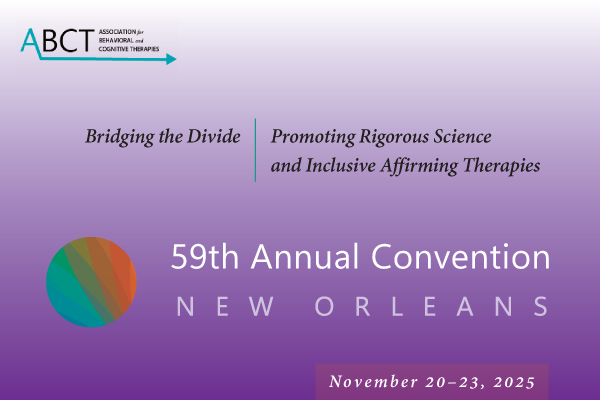Find a CBT Therapist
Search through our directory of local clinicians.

Call for Abstracts 2025
Click here to download the Call for Abstracts 2025
- Program Chair: Brooke G. Rogers, Ph.D., M.P.H.
- Associate Program Chair: Elliott R. Weinstein, M.P.H., M.S.
- ABCT President: Steven A. Safren, Ph.D.
- Conference Theme: Bridging the Divide: Promoting Rigorous Science and Inclusive Affirming Therapies
Abstract Portal Submission
The online portal for general submissions will open on February 10, 2025. The submission portal closes on Friday, March 14, at 11:59 PDT.
Enhancing the reach and impact of cognitive and behavioral therapies requires evidence-based solutions across every level of the translational science continuum. To do this, rigorous approaches to the science and practice of cognitive and behavioral therapies continue to need a broader scope of focus to further generalizability, increase translational impact, identify potential moderators of outcomes, and actively reduce threats to psychological well-being due to structural determinants and a general lack of identity-affirmative care.
This broader scope of focus includes account-ing for contextual, cultural, and diverse factors, as well as solving problems at the intersection of psychology and pub-lic health through scientifically rigorous studies ranging from basic science up and through efficacy/effectiveness and ultimately implementation science. Studies that account for structural and or identity-based (e.g. racial, ethnic, sexual and gender minority) factors that lay the groundwork for increasing the reach and generalizability of evidence-based affirmative treatments are therefore particularly encouraged.
Examples include:
Research at the Interplay of Public Health and Behavioral Health Treatment:
- Studies that address how structural/societal/community-level factors influence the experience of mental health distress and resilience.
— - Studies that address important cognitive and behavioral variables across the translational spectrum, including basic science, neuroscience, and experimental paradigm studies that will inform treatment with diverse populations (e.g., sexual and gender minority, race, ethnicity). This might include: (a) studies with populations of interest that extend relevant basic and translational science, or (b) studies that examine important variables such as racism, sexism, homophobia, transphobia, and how that impacts the experience of mental health distress.
Studies of Affirmative-Based Cognitive Behavioral Therapies With Diverse Populations:
- While principles of learning theory and cognitive-behavioral therapies are considered universal in humans, this point of view can result in CBT being viewed as too narrow in scope. Diverse populations come with different needs that are affected and influence by situation, context, economic, and health disparities. Studies that seek to better understand how to tailor case conceptualization up and through published treatments addressing these factors, in a person-centered affirming way, are also particularly encouraged.
— - Research stemming from newly developed and/or adapted behavioral and cognitive therapy intervention studies aimed at improving outcomes for historically excluded populations or populations experiencing marginalization through chronic systems of oppression (e.g., racism, heterosexism, ageism, transphobia) are encouraged.

